SUMMARY
This is AI generated summarization, which may have errors. For context, always refer to the full article.
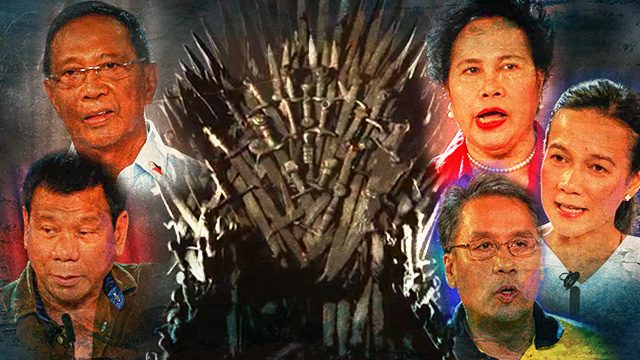

MANILA, Philippines (UPDATED) – Filipino fans of HBO’s hit series Game of Thrones need not look far for some real-life political drama and action. They just have to compare the house flag-bearers’ race to the Iron Throne to the 5 presidential candidates’ race to the country’s top government seat.
There are no dragons or White Walkers in the elections, but the bets’ quest for dominance is just as intense. Armed with verbal bows and arrows, bets battled it out in the 3rd and final presidential debate held in Pangasinan on Sunday, April 24.
But how did the wannabe kings and queens fare on the virtual battlefield? Let’s take a look.
Prologue
Even before the debate, the war was already in full swing.
Davao City Mayor Rodrigo Duterte was the king to beat on Facebook and Twitter – leading the discussions on both social media platforms ahead of the debate.
Duterte led the race on Facebook by owning 68% of conversations on presidentiables, followed by former interior secretary Manuel Roxas II at 46% and Senator Grace Poe at 42%. Vice President Jejomar Binay and Senator Miriam Defensor Santiago, meanwhile, were in the bottom two with 27% and 19% respectively, according to the data covering conversations from November 20, 2015 to April 20, 2016.
Since people may discuss more than one presidential candidate, note that the percentages will add up to more than 100%. The numbers are, however, still useful for comparing the overall size of discussion for one candidate against another.
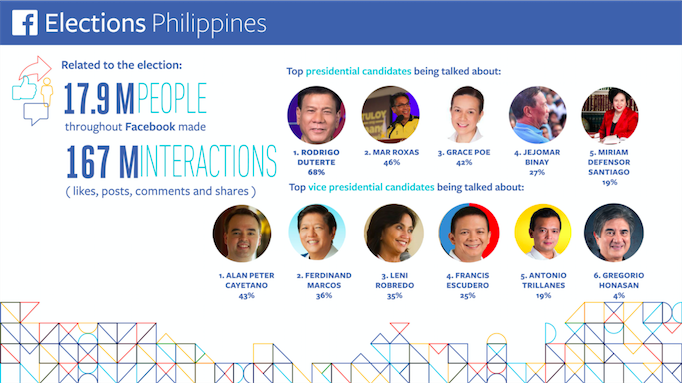
The controversial Davao City mayor also led the Twitter Share of Voice, which ranks the candidates according to the number of times they were mentioned in tweets.
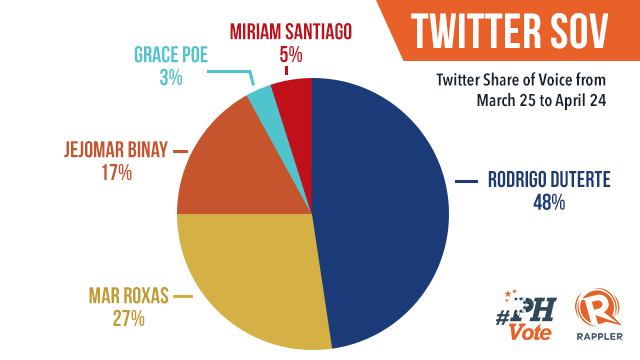
Duterte was the top mentioned candidate from March 25 to 12 am of April 24 at 48%. He was followed by Roxas at 27%, Binay at 17%, Santiago at 5% and Poe at 3%.
But can the king hold the fort?
All-out war
According to a press release from Twitter, over 1.9 million tweets using #PiliPinasDebates2016 were sent during the debate, the biggest Twitter reaction for a presidential debate in the Philippines this year.
height=’320px’>
The Twitter conversation peaked over 17,000 Tweets per minute at around 8:30pm during the heated exchange between Duterte and Roxas when the Mayor claimed that nobody from Davao has benefited from the government’s PhilHealth program.
Binay proved to be a tough foe for Duterte, eventually taking over the lead on Twitter conversations just before the debate.
According to Twitter’s Share of Voice, Binay was the subject of 42% of conversations on Twitter from 12 am to 6 pm. He was followed by Santiago at 27% and Duterte at 20%. Roxas and Poe trailed behind with 9% and 2% respectively.
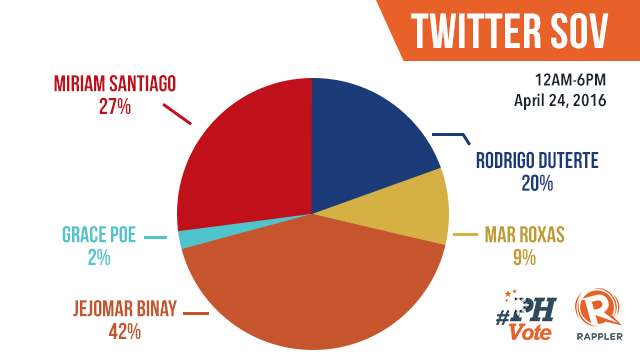
It is important to note, however, that there was a surge of tweets for Santiago, Duterte, and Roxas just hours before the start of the debate, getting them to trend worldwide.
During the first round of debate where the candidates discussed their views on the West Philippine Sea dispute, Duterte was once again the most talked about candidate on Twitter, leading at 36%. He was followed by Santiago at 25% and Binay at 16%.
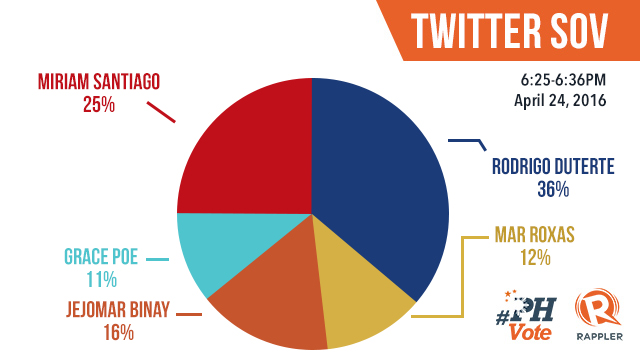
Binay bounced back, however, when the discussions shifted to their plans for solving Manila’s perennial traffic problem. The Vice President shared the top spot with Duterte at 29%.
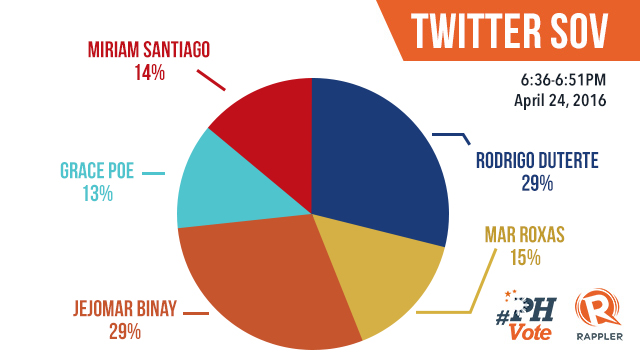
Duterte then regained his lead past 7 pm with 34%, during the discussion on contractual labor. Binay came in 2nd with 28%, while Santiago dropped to last with 10%.
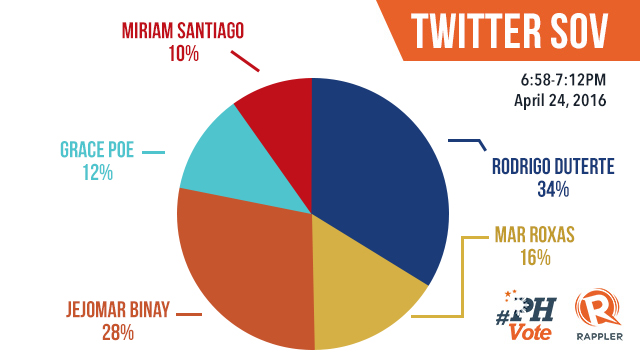
During the discussion on overseas Filipino workers, Duterte fell to 31% but maintained his lead. Binay was still the 2nd most discussed candidate.
In the face-off segment, the Vice President managed to grab the top spot from the Davao City mayor, barely getting ahead of Duterte by 2%. He further increased his lead on Twitter during the “fast talk” segment, climbing to 45%.
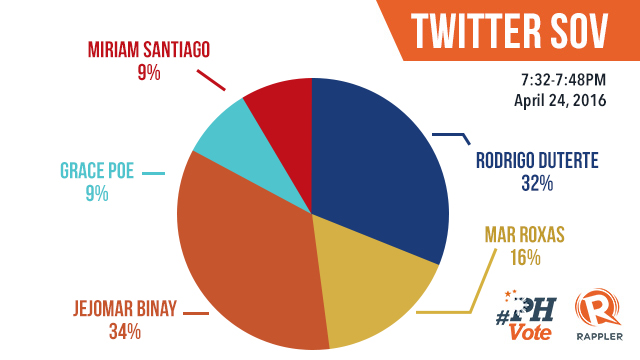
By 8:32 pm, during the discussion on health, Duterte rose back to the top at 36%. He also managed to maintain his lead during the discussion on peace in Mindanao.
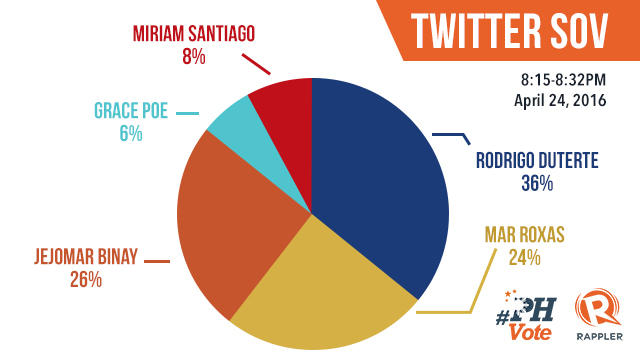
However, when the candidates were giving their closing statements, Binay was once again the most discussed candidate on Twitter, leading at 34%. Duterte followed at 27%, and Santiago was 3rd with 20%. Roxas and Poe were at the bottom two with 10% and 9% respectively.
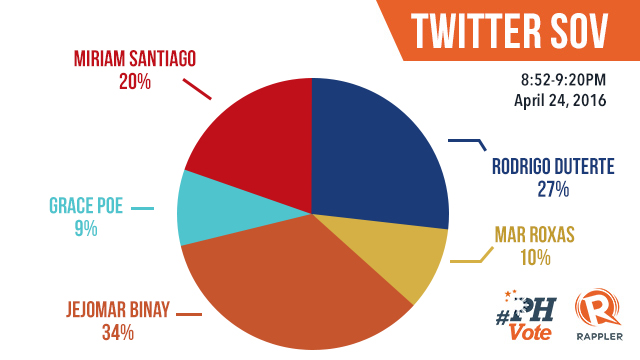
Note that the Twitter Share of Voice only reflects how many times the candidates were mentioned in tweets. These tweets may depict the candidates either positively or negatively.
Among all the topics covered during the debate, it was healthcare that
registered the most interest on Twitter with 20% of the Tweets. This
was followed by discussion on Mindanao at 18%, Traffic at 17%, and the
opening topic of the debate – West Philippines Sea at 15%.
“Filipinos’ participation and engagement in the Twitter conversation for the Presidential TV debates has increased nearly 50% from the first to the last one,” according to Pratiksha Rao, Twitter’s Head for Media Partnerships for Southeast Asia. (READ: ‘#PiliPinasDebates2016: Highs and lows on social media‘ )
Sentiments
Meanwhile, Rappler’s Online Pulse also featured real-time visualization which showed the general sentiments of Twitter and Facebook users, powered by Senti.
According to the data, as of 10 pm on Sunday, 56.5% of social media posts about the debate were neutral, while 22.8% were positive and 20.7% were negative.

Senti also compiled and analyzed posts about each presidential candidate based on the words that were used – whether negative, positive, or neutral. The analysis covers keywords and terms in English, Filipino, Taglish, and any other variations of the language.
As of 10 pm, 44.1% of posts about Roxas were negative, while 41% were neutral and 14.9% were positive.
Posts mentioning Binay were 50.1% neutral, while 22.7% were positive and 27.2% were negative.
There were more positive posts for Poe at 57.7%, while 10.1% were negative. 32.2% were neutral posts.
Meanwhile, 24.4% of posts about Duterte were negative, while 51.1% were neutral and 24.5% were positive.
As for Santiago, she had only 14.7% negative posts and 27.9% were positive. 57.4% were neutral.
For real-time sentiment analysis, go here.
Rappler online polls
Duterte also swept Rappler’s online polls for the 3rd presidential debate. For the poll that asked readers who the debate’s overall winner was, Duterte got 65.74% of the total votes, followed by Roxas with 18.03%.
What do you think of the presidential debate? Who do you think won? Tell us in the comments or share your thoughts on X! – Rappler.com
Iron Throne image courtesy of HBO
Add a comment
How does this make you feel?
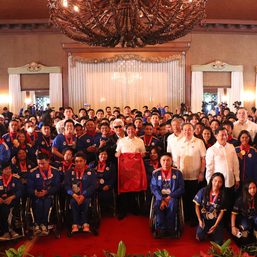
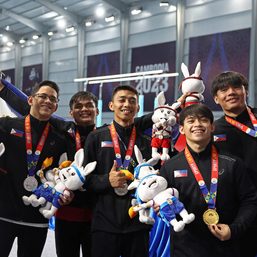

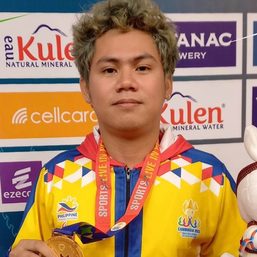
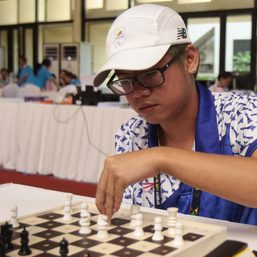
There are no comments yet. Add your comment to start the conversation.